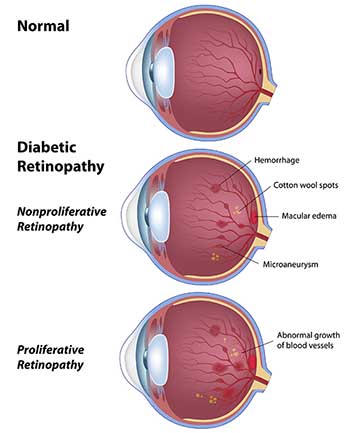
If you have been diagnosed with diabetes, you may be at risk of losing your vision since your body does not utilize sugar properly and, when the sugar levels rise, damage to the retinal blood vessels may occur. This injury to the retinal vessels is known as Diabetic Retinopathy. Diabetic Retinopathy is the leading cause of blindness in working-age adults.
What are the symptoms of diabetic retinopathy?
Often, one may not be aware of any symptoms even when significant diabetic retinopathy is present. When macular edema occurs, vision often becomes blurry and may fluctuate. If abnormal new blood vessels form, as in proliferative diabetic retinopathy, they may bleed and result in small specks or large floaters obscuring the vision. If a large hemorrhage occurs, vision often becomes very blurry.
How is diabetic retinopathy diagnosed?
A comprehensive eye examination by an optometrist or retina specialist is the only reliable means of detecting diabetic retinopathy. After the pupil is dilated, a device called an ophthalmoscope is used to view the retina and determine the extent of the retinopathy. If diabetic retinopathy is discovered, a fluorescein dye test and/or optical coherence tomogram (OCT) may be recommended. A fluorescein angiogram involves the injection of a dye into a vein in the arm followed by several minutes of intermittent photos with a special digital camera focused on the retina. An OCT is a non-invasive photo that creates a detailed cross-sectional image of the macula.
What is the treatment for diabetic retinopathy?
The best therapy for diabetic retinopathy is prevention. Studies show that strict control of blood sugar levels can significantly lower the risk of vision loss from diabetic retinopathy. High blood pressure and kidney problems should also be treated to minimize their effect on the retinopathy. Laser surgery is often the first line of treatment if macular edema or proliferative retinopathy is present. For macular edema, the laser is focused on leaky areas of the retina to aid in reabsorbing the excess fluid. The primary goal of this treatment is to prevent further vision loss. It is uncommon for people to recover significant vision following treatment but some do experience partial restoration. Laser surgery is not a cure for diabetic retinopathy and is not guaranteed to prevent further loss of vision. Other treatments for diabetic retinopathy include medications like steroids or a novel class of medication called anti-VEGF.
Don't Wait! Schedule Your Appointment Today.
At Paul Thompson, OD we value your time and make it easy to book an appointment for care! You can either reach out to us with a phone call or submit this simple online, 'Request an Appointment' form. We respond promptly to all online requests.
Request Appointment


